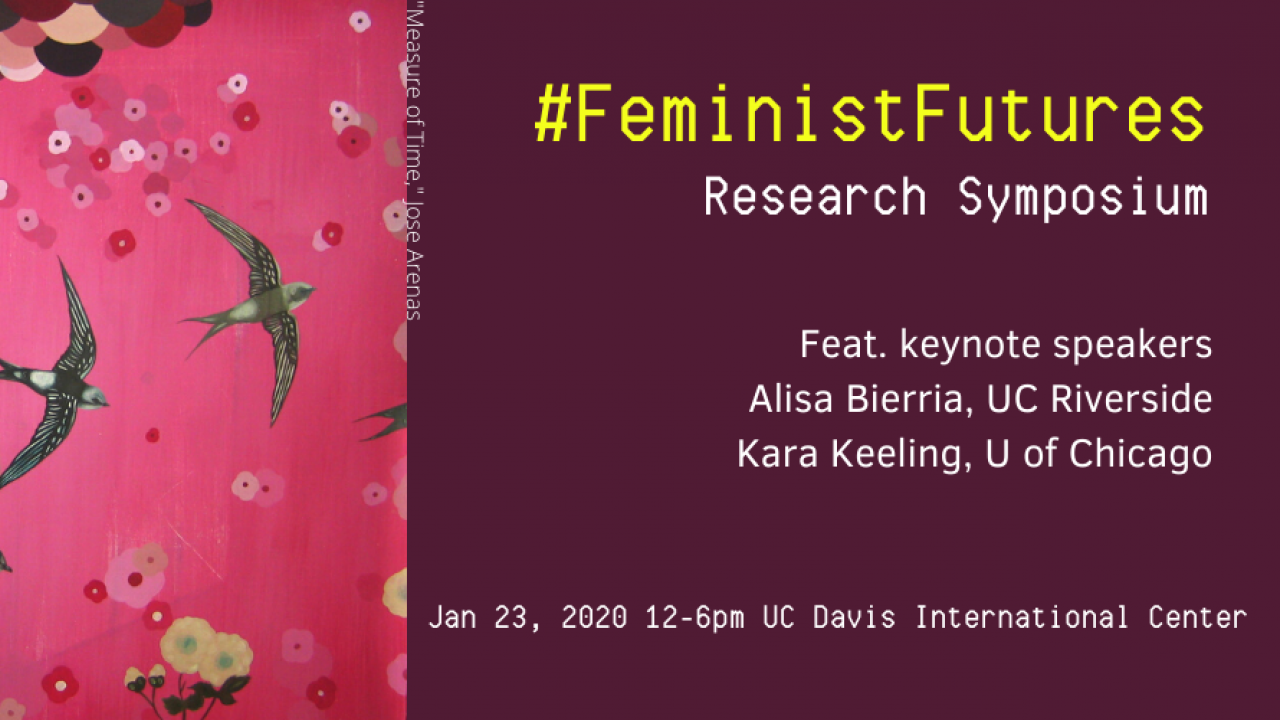
Making Feminist Futures at the Feminist Research Institute Symposium
On January 23, the UC Davis Feminist Research Institute (FRI) convened a group of scholars and activists for a half day symposium around the theme of Feminist Futures. Featuring UC Davis faculty, graduate students, and invited scholar keynotes, the event addressed FRI’s attention to “the need to engage in research practices that imagine a more just world and move us in that direction. Feminists of color along with Indigenous and queer scholars, social justice scientists, writers, and artists all recognize the importance of envisioning the world toward which we want to grow.”
Several key threads emerged throughout presentations on practice-based scholarship. Clare Cannon, assistant professor of Human Ecology, who moderated the first panel of graduate student presenters, highlighted a through line of “troubling what we mean by what we think we know” and "how we are connected and disconnected” as we deconstruct the concepts of sustainability and crisis. For instance, Mercedes Villalba, Ph.D. candidate in Anthropology, spoke about the need for critiques of geothermal energy and notions of sustainability. Geothermal energy, Villalba argued, is “always situated as futuristic.” How then, she asked, to make a critique of geothermal energy responsibly? If critiqued irresponsibly, those very arguments could be weaponized by climate change deniers and elide the chance to create other, more just stories.
After the second panel of graduate student and FRI Fellow presenters, Robyn Rodriguez, professor and chair of Asian American Studies, noted the centrality of questions of labor, care, states, and land to the discussions. FRI Research Fellow Jennifer Mogannam’s talk on liberation movements in Palestine and Lebanon exemplified these engagements. In her presentation, she argued that “what gets captured and recirculated over and over again does not necessarily tell the whole story” and spoke of the power of coalition-building as a mechanism for revolution.
FRI Director Kalidi Vora, professor of Gender, Sexuality, and Women’s Studies, reflected on the role of the imagination in creating more just worlds and the place that tension occupies in that process. In her keynote, Kara Keeling, associate professor of Cinema and Media Studies, University of Chicago, conjured life beyond existing racial capitalist systems. Through her concept of an “empiricism that invites surprises,” a form of knowledge production anchored in Black feminism, Keeling offered a method for creating truths that more accurately reflect our shared reality. Ph.D. candidate in Performance Studies Anuj Vaidya, who read a deep forest speculative history from the perspective of an urban forest near Bombay, embodied such an approach. This kind of imaginative approach draws greater contrast between the contested futures of forest use among urban dwellers, city planners, and the jaguars who live within it.
In her keynote address, Alisa Bierria, assistant professor of Ethnic Studies, UC Riverside, also addressed the problem of limited imagination. Bierria used Jodi Melamed's concept of the activist hermeneutic as an analytical approach in order to both critique systems of power, such as racial capitalism, and enable “epistemologies that conjure life beyond those systems.” Bierria named this process “abolitionist feminist praxis.” She argued that abolitionist feminism works to reconstruct the social bonds that racial capitalism has decimated.
Like speculative literature and other practices of futures-work, coalitions such as Survived + Punished, a national group of survivors of sexual and gender violence as well as advocates, can activate the imagination while making material and social differences in people’s individual lives. One such example is the case of Bresha Meadows, around whose case Survived + Punished coordinated a public engagement campaign to ultimately free the teenage girl facing murder charges for defending herself against her abusive father. Together, these presentations presented powerful ideas on how to live with care and justice in the world.
